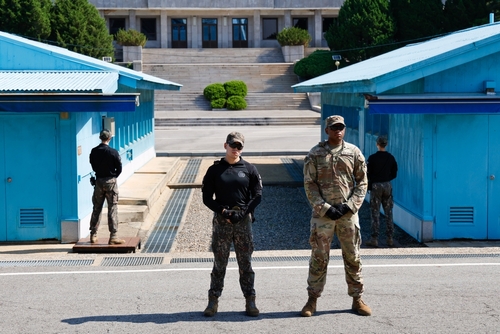North Korean leader Kim Jong-un has reportedly ordered the execution of 30 government officials following the deadly floods that ravaged the country in July 2024. These officials were accused of failing to prevent the catastrophe that resulted in the deaths of over 4,000 people and displaced more than 15,000 residents. The devastating floods, which mainly affected Chagang Province near the Chinese border, triggered landslides that destroyed thousands of homes, roads, and public infrastructure.
According to South Korean media outlet TV Chosun, between 20 and 30 officials were executed late last month, charged with corruption and negligence in disaster prevention. Kim reportedly held these cadres responsible for failing to mitigate the damage caused by the extreme weather, which led to extensive flooding across key areas like Sinuiju and Uiju.
JUST IN:🇰🇵
Kim Jong-Un executes up to 30 officials over deadly flood policy failure pic.twitter.com/Rr2j6XkahX
— Radar 𝘸 Archie🚨 (@RadarHits) September 4, 2024
The officials, who had been tasked with disaster management, were executed as part of a broader purge, signaling Kim's zero tolerance for perceived incompetence within his regime.
This is not the first time Kim Jong-un has taken drastic measures against his own officials. His leadership has been marked by similar actions, with multiple reports of high-ranking officials being executed over alleged failures or political missteps. In this latest instance, the officials were blamed for not adequately preparing for the seasonal rains, despite forewarnings. North Korean state media reported that Kim had earlier issued a stern directive, ordering local authorities to be "strictly punished" for any neglect.
🇷🇺🇰🇵 Vladimir Putin sent condolences to Kim Jong-un over the tragic consequences of floods in North Korea's northwestern provinces.
The Russian president said the DPRK can always count on Russia's help and support, a Kremlin statement said.
The North Korean leader had earlier… pic.twitter.com/E3QNKt8qzg
— Andromeda11711 (@Andromeda11711) September 4, 2024
The floods devastated much of North Korea's agricultural land, exacerbating the country's food shortages. The agricultural damage is particularly concerning for the regime, given the already strained food supply due to international sanctions. North Korea’s decision to reject international aid, including offers from South Korea and China, has further isolated the country in the midst of this humanitarian crisis. Kim's regime has instead focused on internal recovery efforts, with Kim personally overseeing relief operations in some of the worst-hit areas.
During a visit to the flood-stricken regions in August, Kim expressed his frustration with local officials, accusing them of mismanaging resources and failing to implement disaster prevention measures. At the time, he promised that the government would not just rebuild but also modernize the affected areas, using the disaster as an opportunity for urbanization projects.
However, many analysts view these statements as little more than a cover for the regime's harsh crackdown on its internal critics.
Kim’s leadership has long relied on public executions as a tool to instill fear and maintain control. North Korea has a history of such executions, often carried out in public to send a clear message to both the populace and the government elites. Prior to the COVID-19 pandemic, an average of 10 public executions occurred annually, but reports suggest this number has surged in recent years, with more than 100 cases last year alone.

